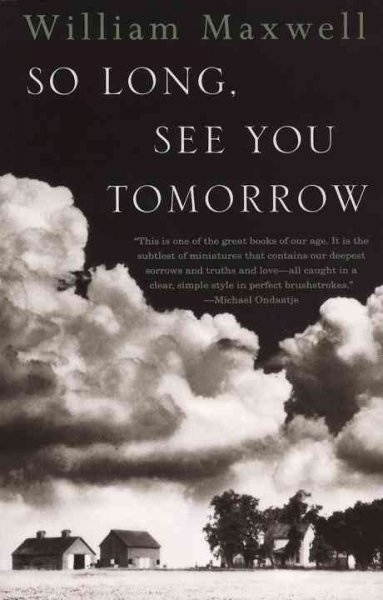
So Long, See You Tomorrow (1980) was published in the 1980's, when author William Maxwell was 71 years old. Maxwell had written other acclaimed novels prior to this one, but the majority of his time and effort had been devoted to his work as the Fiction Editor at the New Yorker, where he elevated the work of some of the best known writers of the 20th century, including John Updike, J.D Salinger, Eudora Welty, John Cheever, and Vladimir Nabokov. Needless to say, by editing others, he honed his own craft and style. Finally retired, Maxwell was able to focus on this pristine and lyrical treasure of a short novel, one which many critics and readers consider his major accomplishment.
Relayed by a wise and vulnerable narrator who is recalling and interpreting events that occurred many years earlier, So Long, See You Tomorrow begins like a thriller, with a spare report of a murder in 1921 rural Illinois. A tenant farmer named Clarence Smith has killed Lloyd Wilson, his neighbor and onetime best friend; Smith then takes his own life. At the same time, the narrator is moving through the loss of his mother and newborn brother to the Spanish influenza. These seemingly disparate events converge in the most unlikely way: the narrator establishes an unusual and moving kinship with Cletus Smith, the son of the murderer.
From there, the parallels begin to unfold. Both boys were victims of terrible events beyond their control, and the narrator goes on to mingle the heartbreak and coming of age of his own boyhood with the devastation of the life of Cletus Smith. As in Thornton Wilder's Our Town, the principal players in the murder tragedy also come gradually to life, as the narrator tries to make sense of wrongs done, especially one done by himself to Cletus, and the persistence of childhood memory to penetrate and shape the course of adult life.
Full disclosure: I first read So Long, See You Tomorrow in 1984, and it is the book I have most often returned to in the decades since. Each time I do, I make some new connection, gain a different kind of insight, appreciate the structure and style, the beauty of the language all over again. If you've yet to read this slender powerhouse of a novel, I encourage you to do so. Maybe more than once.